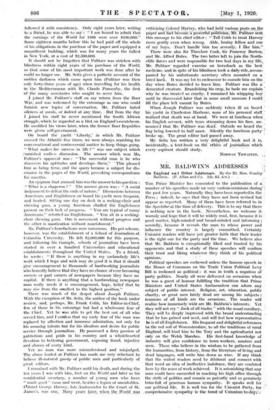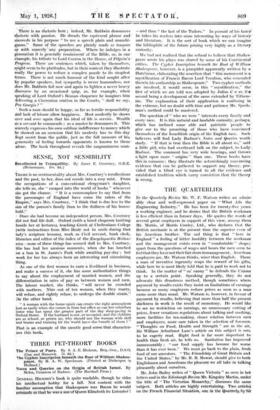Mil. BALD WIN'S ADDRESSES
On England and Other Addresses. By the Rt. Hon. Stanley - - Baldwin.. (P. Allan and Co. 12s. 6d.-nst.)
TILE Prime Minister has consented to the publication of a: number of his speedhes made on very various oceasionsduring' the past few years. Naturally they have been, reported in the Press ; indeed, he says that they have not been revised but appear as reported. Many of them have been referred to in the Spectator-at the thrke'of delivery. This is to say that there is nothing new in the book. Nevertheless, we welcome it warmly and hope that it will be widely read, first, because it is good matter, high-minded-and-broad-niinded and informing ; secondly, because it reveals the man to whose power and influence the country is largely committed. Certainly Unionist readers will have 'yet greater faith that their leader is the right one for the party and the time. We believe also that Mr: Baldwin is exceptionally liked and trusted by his opponents and that a study of these speeches will confirm their trust and liking whatever they think of his political opinions.' r Political speeches are eschewed unless the famous speech in the House of Commons on the Trade Union Political Levy Bill is reckoned as political : it.was in truth a- negation of party politics. Nearly all were delivered on occasions when he was a guest of honour fulfilling the tradition that Prime Ministers and United States Ambassadors can adorn any subject of public interest. . Religion, art, education, public charity, or great men lately dead are among his subjects : reunions of all kinds are the occasions. The reader will realize how immensely wide are Mr. Baldwin's interests.: Yet they will not cry " Jack of all trades " with the usual corollary. They will be deeply impressed with the broad understanding that he has gained and used, and will feel how representative he is of all Englishmen. His frequent and delightful references to the red soil of Worcestershire, to all the traditions of rural England,.will bind him to the Tory and the agriculturist not only on the Welsh Marches. His first-hand knowledge of industry will give -.confidence to town workers, masters and men. Those who believe in the wisdom to be gathered from the humanities, from history, from the literature of living and dead languages, will write him down as wise. If any think that the widest readers need be dilettanti and connect with that word an idea of ineffectivelndolence, they are confuted here by the mass of work achieved. It is astonishing that any man could, have succeeded in reaching his high office through the strife of politics and remain so patently and so genuinely brim-full of generous human sympathy. 'It sPeaks well for our political life. It is well too for the Unionist Party, for " comprehensite sympathy-is-the' bond-of -Unionism- today: There is no rhetoric here ; indeed, Mr. Baldwin denounces rhetoric with passion. He dreads the equivocal phrase and ' succeeds in his purpose " to use a speech plain and unambi- pous." Some of the speeches are plainly made ex tempore or with scarcely any preparation. - Where he indulges in a
peroration it is generally reminiscent' of the Bible, or, in one ' example, his tribute to Lord Curzon in the House, of Pilgrim's'
Progress. There are sentences which, taken by themselves, Tight seem to be platitudes, but in their context they illustrate - really the power to reduce a, complex puzzle to its simplest terms. There is not much humour of the kind sought after ' by popular speakers, but Sympathy is never humourless, nor does Mr. Baldwin fail now and again to lighten a never heavy discourse by an occasional quip, as, for example, when • Speaking of Lord Oxford's Roman eloquence he imagines him delivering a Ciceronian oration ,in the Courts, " shall we say, Pro Georgio " ' Such a man should be happy, so far as terrific responsibility and lack of leisure allow happiness. Most modestly he shows over and over again that-his ideal of life is service. Wealth' as a servant he commends ; as a master he denounces it. This Scarcely expresses his own sublime indifference to money which he showed on an occasion that his modesty has to this day kept secret from the public, just as the full measure of his generosity of feeling towards opponents is known to them alone. The book throughout reveals the magnanimous man-















































 Previous page
Previous page